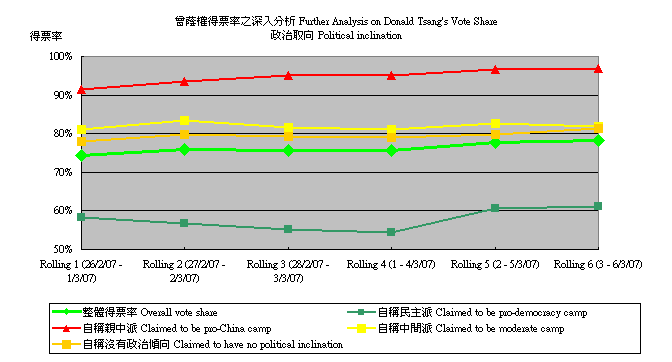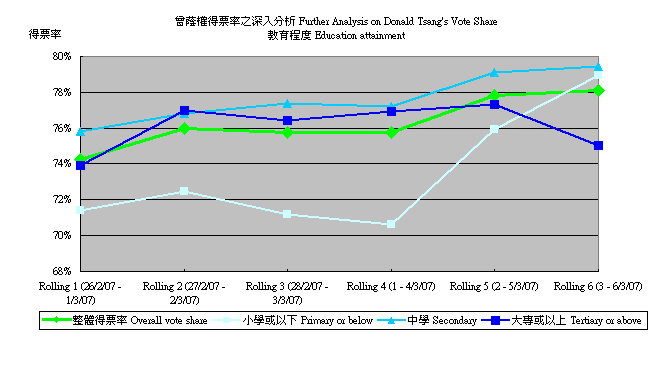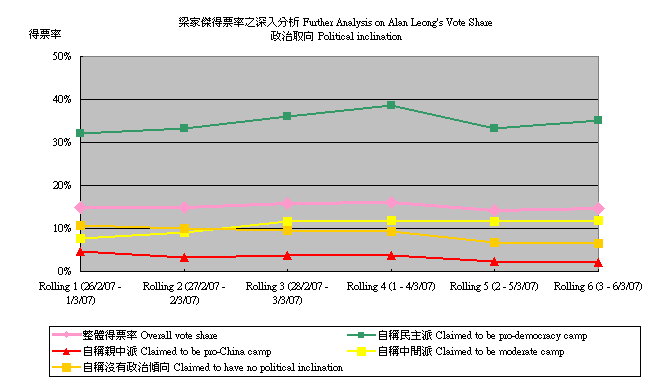Press Release on March 9, 2007
|
| |
|
| Special Announcement | Background
| Latest Figures | Concluding Remarks |
| Detailed Findings (First
set of CE Election rolling survey wrap-up figures 2007)
|
|
| Special Announcement |
| |
|
The Public Opinion Programme (POP) at the University of Hong Kong today releases the first set of CE Election rolling poll wrap-up figures. The latest figures of such surveys have been released by the sponsors and used by them exclusively for at least 48 hours, before they are uploaded onto the "HKU POP SITE"
(http://hkupop.pori.hk) for public consumption. Organizations wishing to join the sponsorship of these surveys are welcome to contact Miss Chau or Miss Pang at 2859-2988.
|
|
|
| Background |
| |
|
In 1996, the Public Opinion Programme (POP) at the University of Hong Kong conducted many rounds of surveys on the Chief Executive election, most of which were conducted after Tung Chee-hwa formally announced his intention to stand for the election. During the 2005 CE by-election, because a number of well-known political figures had declared their intention to stand, POP therefore also started our CE election polling routine. Between the end of January and early February this year, both Alan Leong and Donald Tsang embarked on their CE election campaigns, POP therefore switched on our CE election series accordingly. In our three rounds of feature survey, respondents were asked to rate the suitability of Leong and Tsang, as well as to vote hypothetically. The results have already been released some time ago.
The first set of CE Election rolling poll wrap-up figures released by POP today via the POP Site is similar to the three rounds of feature survey, in that respondents were asked to rate the suitability of the candidates to the post of CE, with 0 indicating absolutely not suitable, 100 indicating absolutely suitable and 50 indicating half-half. They were also asked to vote on the two candidates hypothetically. In-depth demographic analyses are also presented.
|
|
|
| Latest Figures |
| |
|
As a general practice, the figures in each study have been weighted according to the gender-age distribution of the Hong Kong population obtained from the population census. The contact information of the studies are tabulated as follows:
|
| Rolling surveys |
| Date of Surveys |
26/2-1/3 |
27/2-2/3 |
28/2-3/3 |
1-4/3 |
2-5/3 |
3-6/3 |
| Sample base |
1,201 |
1,058 |
1,052 |
1,044 |
1,036 |
1,050 |
| Overall response rate |
65.3% |
67.0% |
64.9% |
65.8% |
63.3% |
63.4% |
| Sampling error of percentages (at 95%conf. level)* |
+/-3% |
+/-3% |
+/-3% |
+/-3% |
+/-3% |
+/-3% |
| Sampling error of ratings (at 95%conf. level)* |
Please refer to the relevant frequency tables |
* "95% confidence level" means that if we were to repeat a certain survey 100 times, using the same questions each time but with different random samples, we would expect 95 times getting a figure within the error margins specified.
|
|
Rolling survey results of Donald Tsang are summarized below:
|
| |
| Rolling surveys |
Donald Tsang |
| Date of surveys |
26/2-1/3 |
27/2-2/3 |
28/2-3/3 |
1-4/3 |
2-5/3 |
3-6/3 |
| Sample base |
1,201 |
1,058 |
1,052 |
1,044 |
1,036 |
1,050 |
| Overall response rate |
65.3% |
67.0% |
64.9% |
65.8% |
63.3% |
63.4% |
| Findings/errors* |
Finding |
Finding |
Finding |
Finding |
Finding |
Finding |
| Suitability ratings |
70.1 |
70.8 |
70.3 |
70.8 |
70.5 |
70.5 |
| Political inclination – self-defined: |
| Pro-democracy |
66.3 |
66.8 |
65.3 |
67.1 |
65.4 |
64.8 |
| Pro-China |
80.8 |
80.9 |
80.1 |
79.3 |
78.0 |
79.4 |
| Moderate |
70.4 |
71.7 |
70.4 |
70.5 |
70.4 |
70.6 |
| No preference |
71.1 |
70.8 |
71.6 |
71.9 |
72.3 |
72.6 |
| |
|
|
|
|
|
|
| Hypothetical voting |
74.2% |
76.0% |
75.8% |
75.8% |
77.8% |
78.1% |
| Political inclination – self-defined: |
| Pro-democracy |
58.4% |
56.6% |
55.2% |
54.4% |
60.5% |
61.1% |
| Pro-China |
91.4% |
93.5% |
95.2% |
95.0% |
96.6% |
97.0% |
| Moderate |
81.1% |
83.3% |
81.5% |
81.2% |
82.6% |
81.9% |
| No preference |
78.1% |
79.9% |
79.2% |
78.9% |
79.7% |
81.4% |
* "95% confidence level" means that if we were to repeat a certain survey 100 times, using the same questions each time but with different random samples, we would expect 95 times getting a figure within the error margins specified.
|
|


|
|
Our latest rolling survey (from March 3 to 6) shows that Donald Tsang's suitability rating was 70.5 marks which remained unchanged when compared with the last rolling survey (from March 2 to 5). As for the hypothetical voting, 78% supported Donald Tsang as the Chief Executive, with a 0.3-percentage-point increase.
|
| |
| Rolling surveys |
Alan Leong |
| Date of surveys |
26/2-1/3 |
27/2-2/3 |
28/2-3/3 |
1-4/3 |
2-5/3 |
3-6/3 |
| Sample base |
1,201 |
1,058 |
1,052 |
1,044 |
1,036 |
1,050 |
| Overall response rate |
65.3% |
67.0% |
64.9% |
65.8% |
63.3% |
63.4% |
| Findings/errors* |
Finding |
Finding |
Finding |
Finding |
Finding |
Finding |
| Suitability ratings |
44.5 |
45.3 |
46.1 |
47.4 |
46.6 |
46.2 |
| Political inclination – self-defined: |
| Pro-democracy |
55.4 |
56.3 |
57.0 |
58.2 |
55.6 |
56.0 |
| Pro-China |
31.7 |
29.2 |
29.3 |
34.5 |
34.8 |
31.4 |
| Moderate |
41.1 |
43.1 |
44.7 |
45.6 |
45.5 |
44.5 |
| No preference |
40.6 |
41.9 |
42.7 |
44.4 |
43.8 |
43.9 |
| |
| Hypothetical voting |
14.9% |
14.8% |
15.8% |
15.9% |
14.2% |
14.7% |
| Political inclination – self-defined: |
| Pro-democracy |
32.0% |
33.2% |
36.0% |
38.7% |
33.4% |
35.0% |
| Pro-China |
4.7% |
3.3% |
3.7% |
3.8% |
2.3% |
2.0% |
| Moderate |
7.7% |
9.0% |
11.6% |
11.9% |
11.6% |
11.8% |
| No preference |
10.6% |
9.9% |
9.6% |
9.4% |
6.8% |
6.6% |
* "95% confidence level" means that if we were to repeat a certain survey 100 times, using the same questions each time but with different random samples, we would expect 95 times getting a figure within the error margins specified.
|
|


|
|
Our latest rolling survey (from March 3 to 6) shows that Alan Leong scored 46.2 marks in terms of his suitability to be Chief Executive. This marked a drop of 0.4 mark when compared with the last rolling survey (from March 2 to 5). Regarding the hypothetical voting, 15% supported Leong, with a 0.5-percentage-point increase.
|
|
Concluding Remarks
Regarding the above-mentioned first rolling poll wrap-up figures, POP is not to provide commentary as the figures should be self-explanatory. In this press release, we have especially indicated the extent of support for each candidate with respect to the education level and political inclination of the respondents. This is because POP finds them worth-noted after analyzing the figures. The general public is welcome to analyze other demographic variables by viewing the details in our POP Site directly. POP would continuously monitor all the data changes from the rolling surveys, and gradually increase the daily sample size in order to better explain the daily changes of the figures. However, all the results will be first delivered to our sponsors for their use and release, and then uploaded to our POP Site after at least 48 hours. Please take note of this.
It is our general practice to answer all questions on the research design of the surveys published in the POP Site as soon as we receive them, but we will not further comment on the findings. We welcome questions for follow-up purpose, please email them to us at <[email protected]>. We will keep such an arrangement under constant review, suggestions most welcome. Please note that everything carried in the POP Site does not represent the stand of the University of Hong Kong. Dr Robert Ting-Yiu Chung, Director of POP, is responsible for everything posted herewith, except for column articles which represent the stand of their authors.
|
|
|
|
| Special Announcement | Background
| Latest Figures | Concluding Remarks |
| Detailed Findings (First
set of CE Election rolling survey wrap-up figures 2007)
|
|











